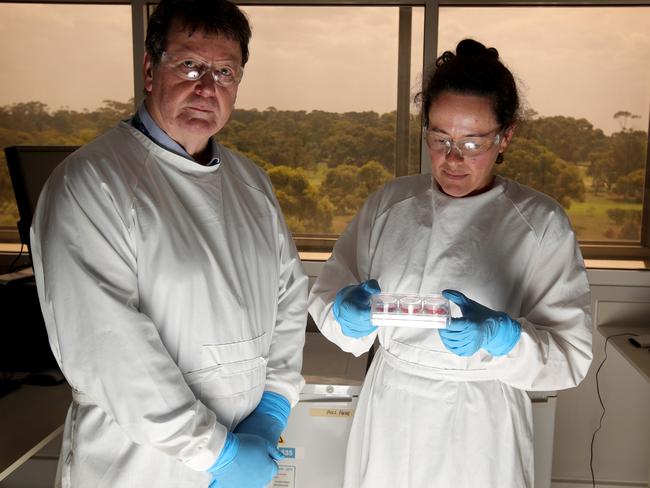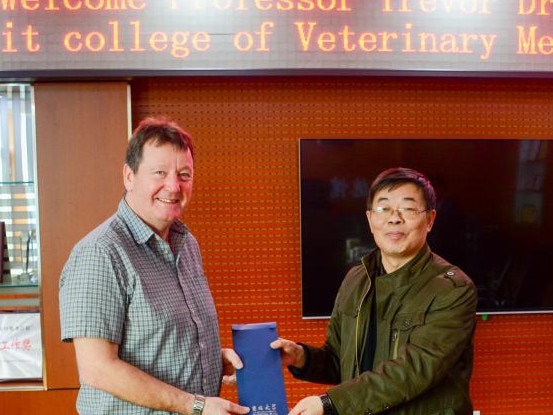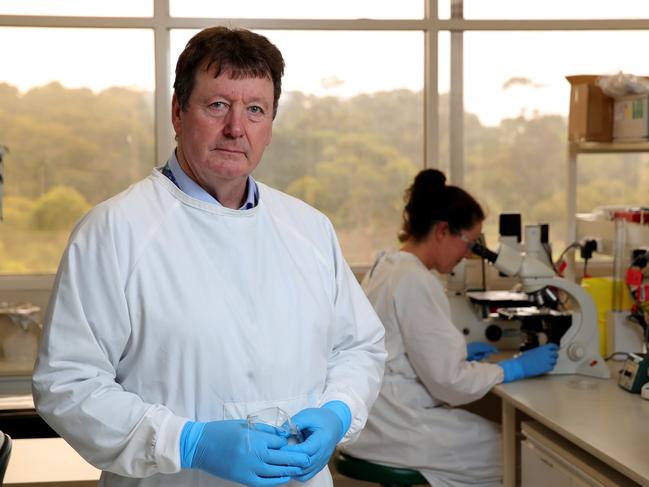Hackers a threat to vaccine developers, warns CSIRO boss
Vaccine manufacturers may become the main targets of hackers as the race for a coronavirus cure heats up, the head of the CSIRO’s biosecurity lab has warned.
Exclusive: The head of CSIRO’s biosecurity laboratory says the world should be concerned about hacks on coronavirus vaccine research.
Prof Trevor Drew insisted his elite facility in Geelong, Victoria, was safe from cyber attacks.
However, he warned that vaccine manufacturers now may be the main targets.
When asked about reports of Chinese, Russian and Iranian cyber attacks on science institutions, Prof Drew said: “As a general comment I think everyone should have concerns but the nice thing about CSIRO is that we have a very good computer wing, computer arm Data61 that look after all of our cyber security so I have no overt concerns.
“There’s not a lot that we could tell them other than perhaps some of the results we’re getting but that would be it, we don’t have any of the details of how these vaccines were manufactured.
“I would have thought that where they’re going to, the vaccine developers would be the target
We’re not developers so I doubt that we would be a target but even so as I said we’re obviously alert to these issues.”

Prof Drew’s comments were made in a wide-ranging interview this week before his links with PLA’s Academy of Military Medical Sciences, Dr Tu Changchun, were made public by News Corp.
News Corp did not suggest that Prof Drew behaved in any way unethically in his dealings with Dr Tu when they worked together in China.
The CSIRO in Geelong was chosen to test two of the most promising potential coronavirus vaccines, one developed by Oxford University and another from Inovio Pharmaceuticals from the United States.
The laboratory was chosen by the Centre for Epidemic Preparedness Innovations, which was funded by the Bill and Melinda Gates Foundation.
The CSIRO had done a dummy run of who it would prepare for a pandemic in October last year, making it best placed to fast track vaccine research.

Ferrets are being injected with the Oxford vaccine, which was already substantially developed for other viruses before COVID-19 hit.
They were then being given a dose of COVID-19 to monitor whether it was able to produce enough antibodies to provide protection.
Scientists were working 20 hours a day to speed up the results, which were expected by the end of June.
A team of 80 people, including engineers and maintenance staff, were working on the virus in shifts.
Prof Drew said he was unable to disclose results because of his agreement with CEPI, but spoke about the science behind the Oxford University vaccine.
“It’s a very effective and modern type of vaccine but the great thing about it is as well as being built with 21st century science, there are vaccines of that type already being used so its proof of principle is already there,” he said.

“It’s gone a long way down the safety route already. It’s already been demonstrated that it’s safe.
“The only thing that the Oxford crew have done was they were able to get the sequence of the spike protein from the genomic sequence published by the Chinese and just drop that into their plug and play adenovirus before they even got the virus.
“They were really quick off the mark and that’s why they were one of the two we were able to trial in our first batch of vaccine trials.”
The Inovio Pharmaceuticals virus used DNA to attack COVID-19.
“They do require a highly elegant system of trying to get the vaccine into the cells,” he said.
There is a race worldwide to develop a coronavirus vaccine to save hundreds of thousands of lives and also open up world economies, which have been crippled under lockdowns.
There are at least 100 vaccines being tested across the globe, but the Oxford University vaccine was one of the most promising.

CEPI’s decision to test it at CSIRO in Geelong, one of the leading facilities in the world for animal research, was also a sign of which horse it was putting its money on in the vaccine race.
CSIRO was testing how much immunity was provided by single dose and double doses of the Oxford University vaccine.
Any need for a second dose, either in a year or weeks after the first injection, would significantly delay the vaccine’s roll out across the world.
Oxford University Prof Sarah Gilbert has claimed that she was “80 per cent confident” that the vaccine would work.
There were plans to manufacture 1 million doses of the vaccine by September, before it was officially signed off, to speed up its rollout.
Prof Drew said that there was a chance that any COVID-19 vaccine may need to be inhaled rather than injected so it could better target the lungs.
“Respiratory disease generally the vaccines generally if you give them in the arm they’re not so good as if you sniff them or have them in a vapour that you inhale so it may be that ultimately that a vaccine may require one muscular, one in the nose,” he said.
“There’s various combinations you could use to try and induce that immunity in the lung of the person rather than in the blood of the person.
“I don’t think it would be any easier to give, you’d still have to have some sort of atomising device to put it up someone’s nostril. These are quite common in veterinary practice particularly against respiratory viruses.”
Prof Drew also praised Australians for sticking to the lockdown rules and those who have self isolated to prevent the spread of the disease.
Any new vaccine was also likely to require refrigerators when distributed, making it more difficult to roll out in developing countries.

